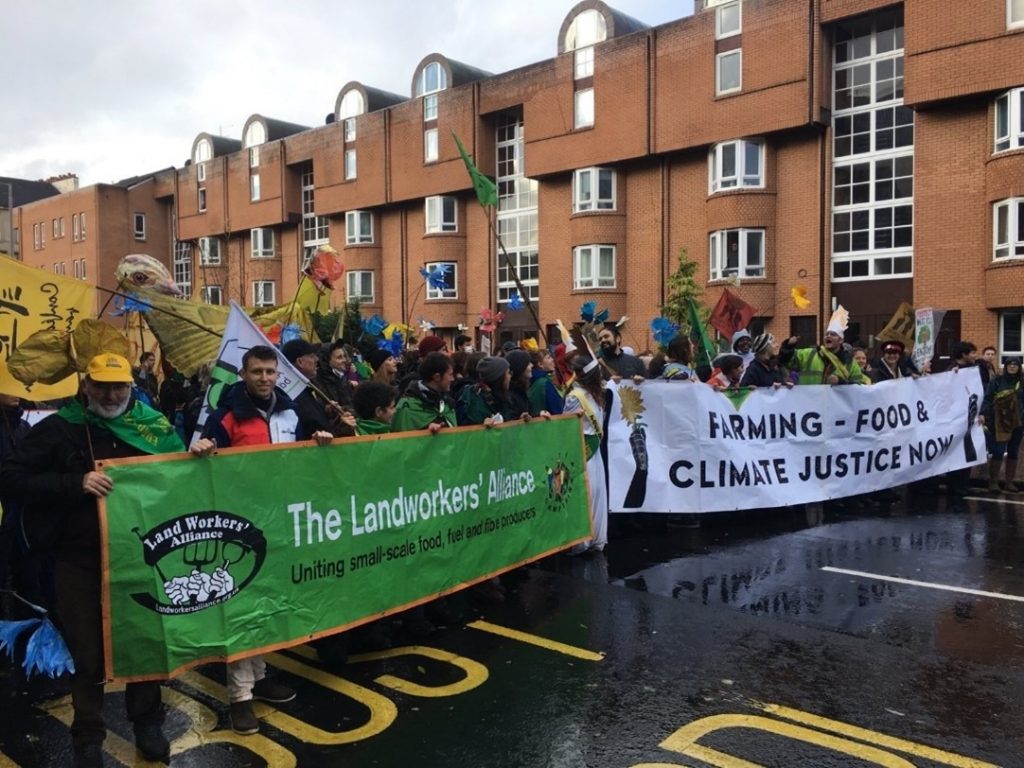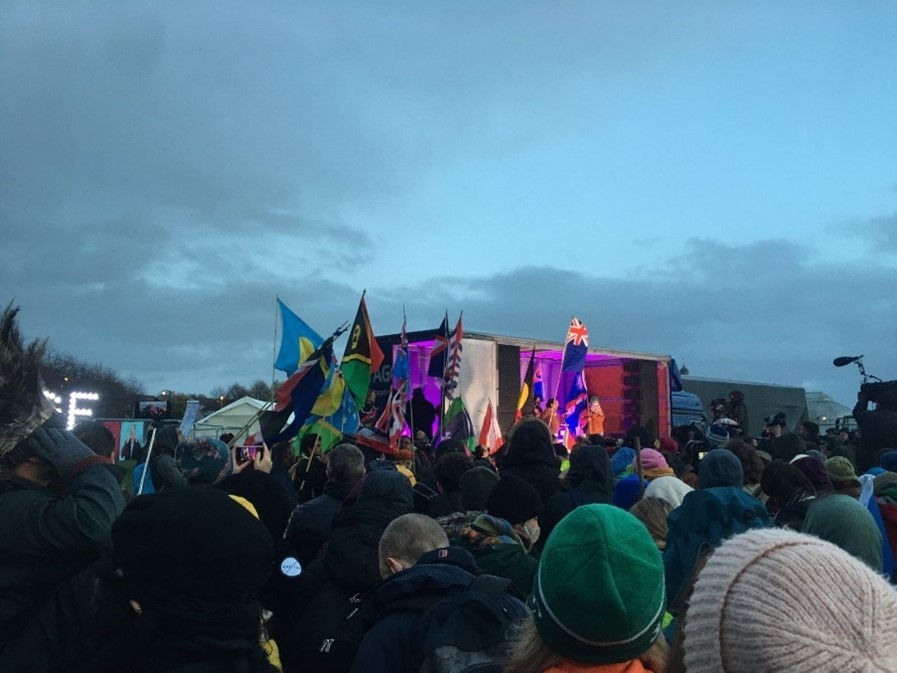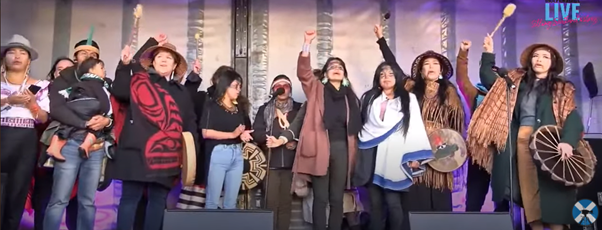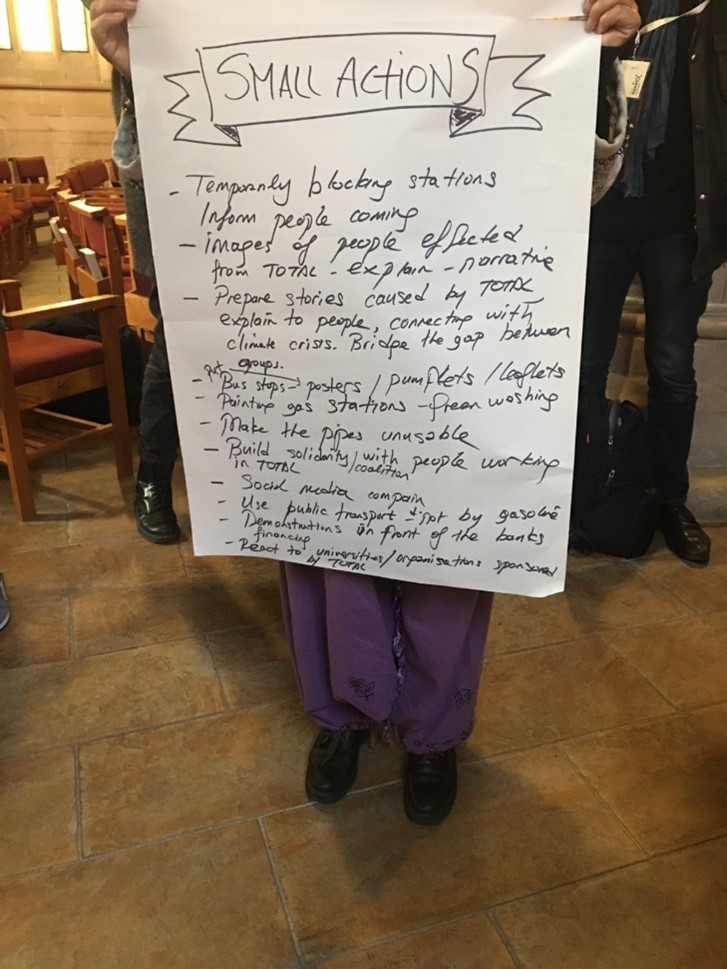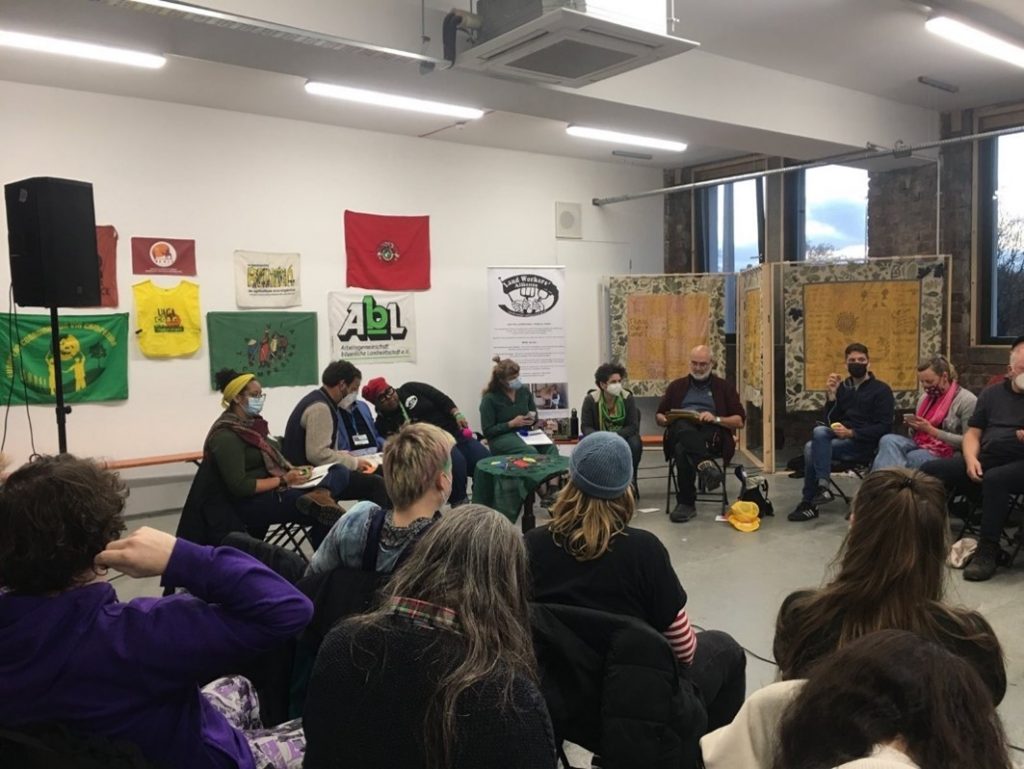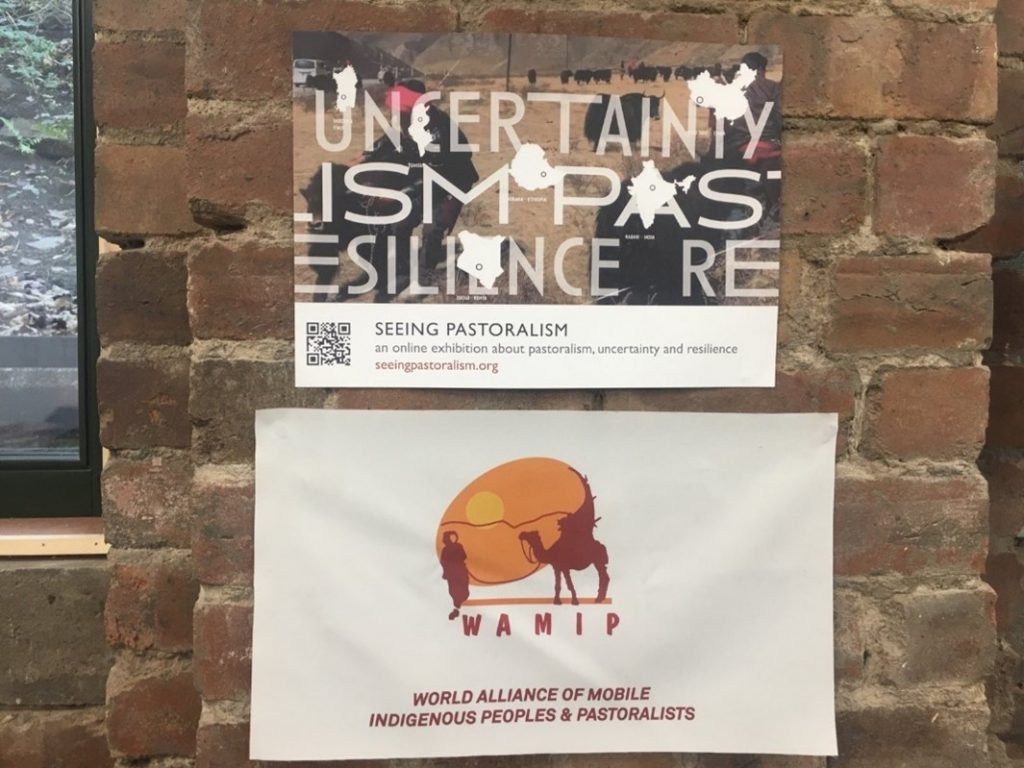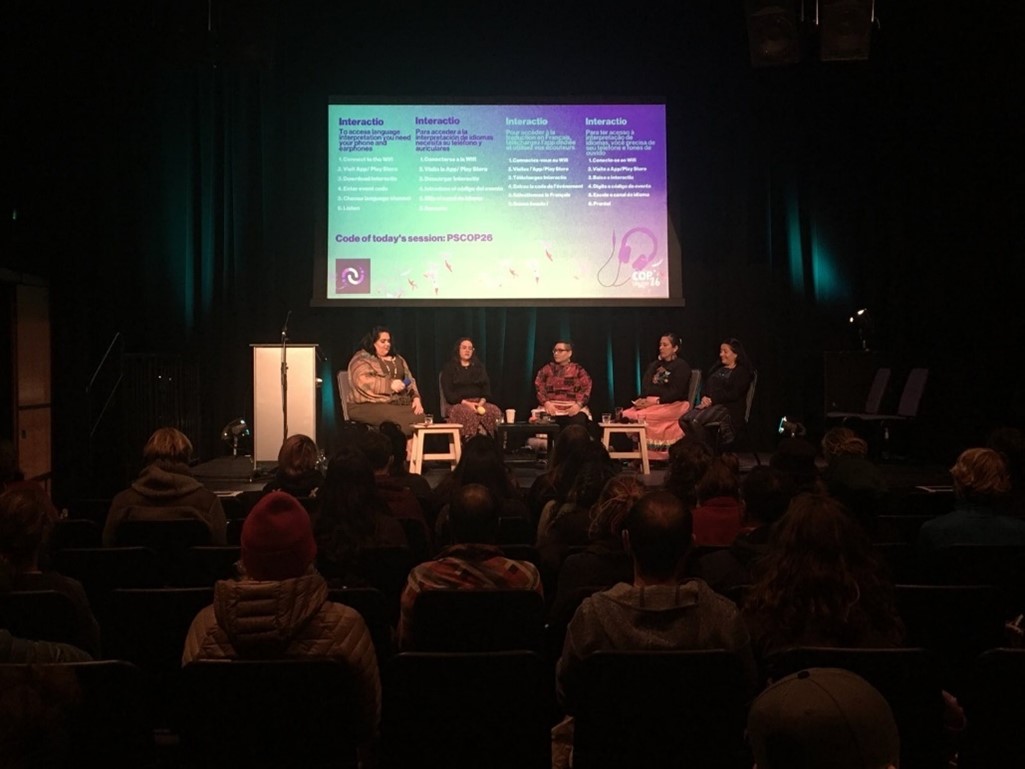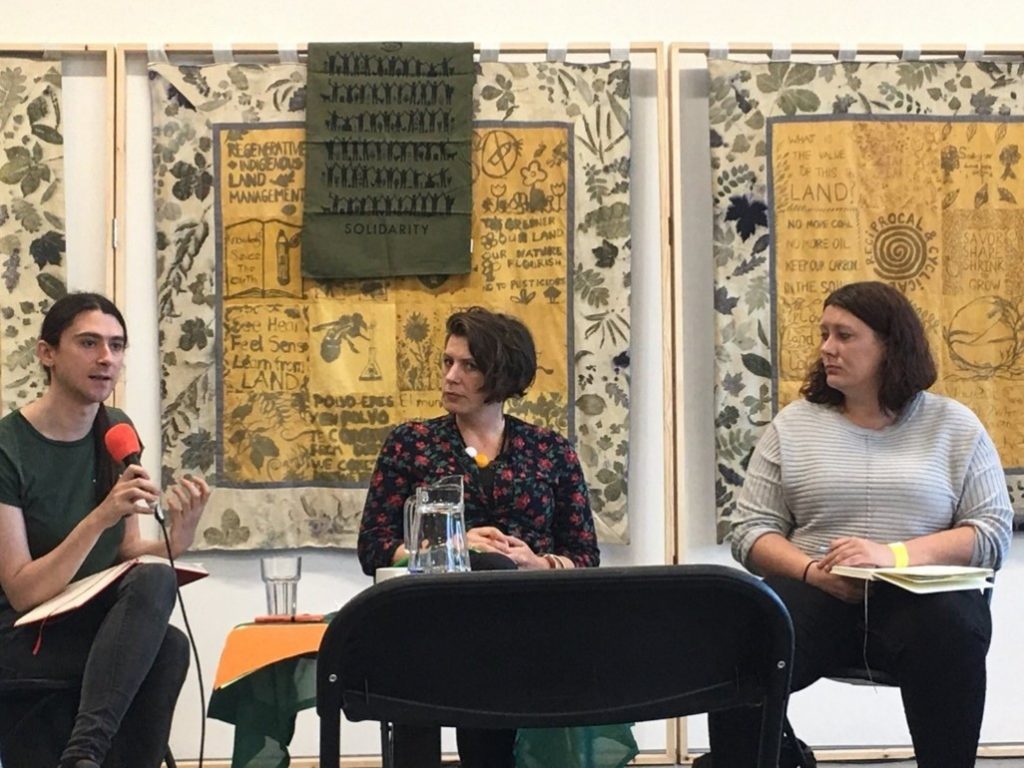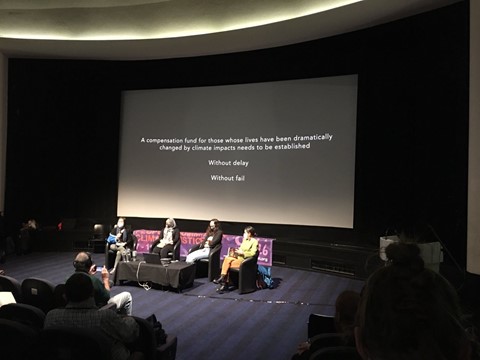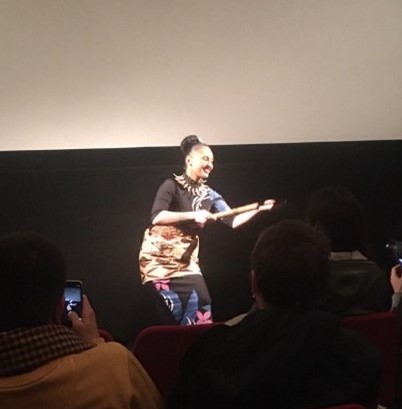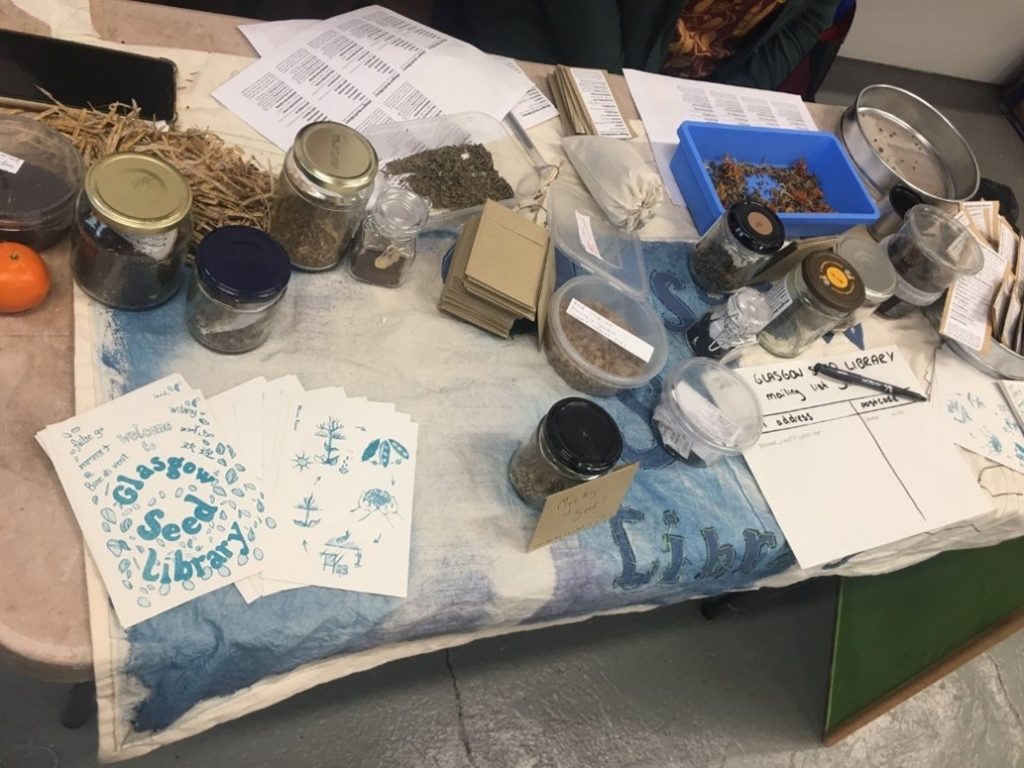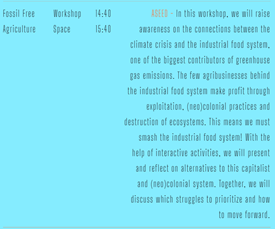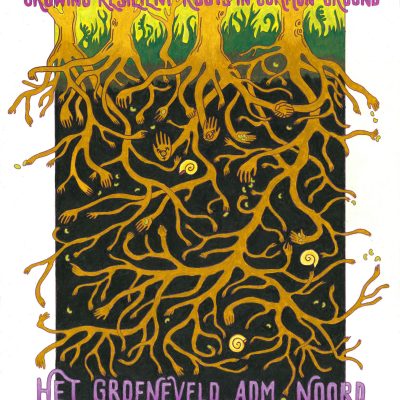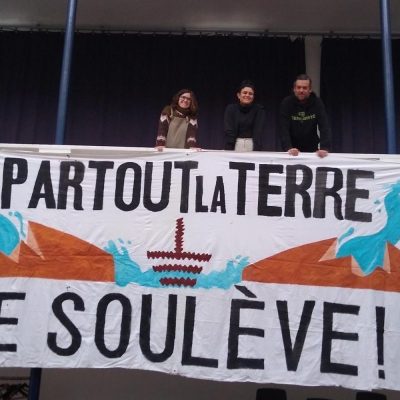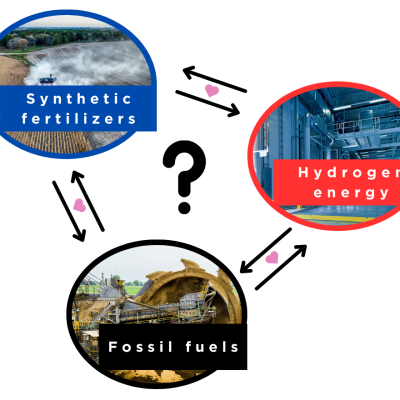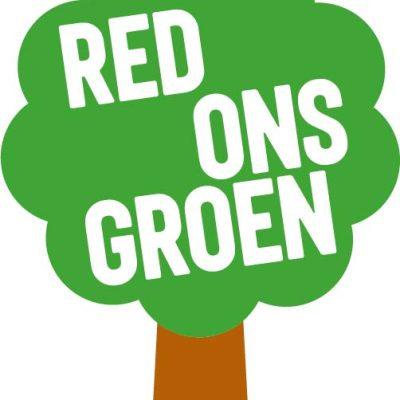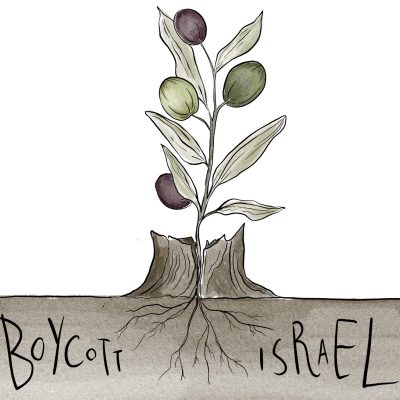The COP will not provide us solutions. This is the 26th COP and our house is still on fire. This is the embodiment of how capitalism makes our political system unable to act appropriately. We must show that the climate crisis is not simply a crisis of greenhouse gases, but a predictable outcome of a capitalist society who’s only goal is to multiply profit on the backs of communities in the Global South and Indigenous communities all over the world.
Multinationals have more power on politics than the people. We can see this in the tremendous amount of multinationals that are present in the COP, mingling and discussing with political leaders. The fossil fuel industry’s delegation was bigger than of any other country. In total, 500 people within the COP were found to have an interest linked to the fossil fuel industry (BBC). This shows that profit is more important than the wellbeing and the will of the people. Is this democracy?
However, the COP is extremely important for the global Climate Justice movement. It is a place to learn and listen to each other, to connect and leave the place with more anger, more empowerment and more strength. It is a place, where frontline communities, who are the most affected by the climate crisis can share their struggles and demands and where people from the Global North can listen and understand how to best support and amplify the voices of those who should lead the way to a more just future. Not often do you have the opportunity to meet indigenous leaders who share their wisdom and ceremonies. This is extremely important to create an emotional connection and to open the hearts to their knowledge. Indigenous peoples hold the solution to the climate crisis and by engaging with them, one can get a small insight into their rich culture and their connection to their land and ancestors.
Not seldom are the mining and polluting companies that destroy indigenous lands based in the Global North that continue colonial practices until today. Therefore we, as groups from the Global North must act locally, centering the voices and the will of those most affected by the climate crisis.
However, for many communities from the Global South, the travel to Scotland was almost impossible due to vaccine apartheid and racist visa regulations. It is crucial that we call out our governments!
As we cannot rely on political figures to educate us, we must educate ourselves and form strong, global links. We must remember that the solutions to many problems exist, but we must be able to listen to those who have been fighting for these solutions for decades/centuries. We must listen to small scale farmers, to indigenous leaders, to frontline communities, to marginalized communities etc. Only that way will we be able to unite as people and to overthrow the few that are in power.
What happened on a grassroots level?
“For every day that passes, this conclusion receives further confirmation: the ruling classes of this world are constitutionally incapable of responding to the catastrophe in any other way than by expediting it. Unfortunately, COP26 did not produce any compelling reasons to revise that conclusion.” (Andreas Malm in The Guardian)
Meanwhile…
The climate movement grew stronger: The people’s summit and the amazing work done by the COP26 coalition
Who’s the COP26 coalition?
Check this video
“This November, world leaders met in Glasgow, at the global climate talks, COP26. So far, governments have done too little, too late. Justice won’t be handed to us by world leaders or delivered by corporations. Only we can imagine and build the future that works for all of us. The solutions that we need already exist, but our leaders lack the political will to act. COP26 Coalition brought together movements from across the world to build power for system change from indigenous struggles to trade unions, from racial justice groups to youth strikers.”
Everyone on the COP26 Coalition team spent weeks working overtime to bring the Global Day of Action, the People’s Summit, Movement Assemblies, Coalition gigs, and various hubs to life.
Global Day of Action for Climate Justice – Glasgow, 6th of November
ASEED joined the Farmers, Foresters and Land workers Bloc to demand Food Autonomy and Climate Justice Now!
“Globalize the struggle, globalize hope!”
“Viva La Via Campesina, Viva!”
At the end of the march we gathered to hear the speeches hold by worldwide climate activists. Mitzi Jonelle Tan, Filipino climate justice activist told the audience that “The leaders are not inside the UN climate summit, they are right here. Here are the true leaders of the climate movement”. We couldn’t agree more. The stage was a true platform for platform for Global South voices!
Check the recording of the march and the speeches here
Here is a press release where you can find the names and descriptions of the different speakers
People’s Summit for Climate Justice – Glasgow, 7th – 10th November
Aseed had the chance to learn from other grassroots organizations and movements during the different sessions and workshops. We mostly attended sessions that were focusing on agriculture and food justice, fossil capitalism and that were centering the voices of frontline and indigenous communities.
Here is an overview of the sessions we attended. We included links to the websites of the inspiring organizations, groups and movements that contributed to the sessions. Don’t hesitate to click on them to learn more about their work, struggles, demands and visions!
Workshop: Collapse Total – taking on the big polluters
This session focused on how to take on fossil fuel monster Total, one of biggest emitters in history that operates in 130 countries around the World, fuelling the climate crisis, destruction and neocolonialism, while greenwashing itself as something new.
From the 15th to 22nd of November 2021, different groups that signed the Glasgow Agreement took on multinational Total all over the world in decentralized direct actions and acts of non-cooperation.
Check this link if you want to learn more about the Glasgow Agreement – Peoples’ Climate Commitment
Some contributors to the session:
Panel: Global Peasant Led Struggles – highlighting agroecology as a solution
This was probably one of the most inspiring talks we have ever heard! The panel focused on the Agroecology and Food Sovereignty movement, and presented some of the ways in which grassroots farmers, land workers, foresters and food sovereignty activists worldwide organize to find real solutions to the climate crisis.
Check the Nyéléni declaration, adopted at the 2007 Forum for Food Sovereignty in Sélingué, Mali, by 500 from more than 80 countries, and a reference on the social movement’s perspective on food sovereignty since then.
Some of the contributors to the session:
La Via Campesina – International Peasant’s Movement: Link
European Coordination Via Campesina: Link
WORLD ALLIANCE OF MOBILE INDIGENOUS PEOPLES (WAMIP): Link
Land workers Alliance (UK): Link
National Farmers Union : Link
Organización Boricuá de Agricultura Ecológica: Link
El Puente: Latino Climate Action Network: Link
Panel: Indigenous feminisms: fighting at the frontline of climate chaos
This session brought together indigenous women leaders.
“Indigenous women are in deep, dignified struggle on the frontlines of climate and social injustice. They are also at the forefront of real solutions that are regenerative, rooted in indigenous cosmology, promote economies of life over profit, and are fiercely courageous.”
Some of the contributors to the session:
Cultural survival (learn more about this organization in our portraits section): Link
It takes roots: Link
Climate Justice Alliance (CJA) brings strategies for a Just Transition and reinvestment to a regenerative economy: Link
Panel: Migrant and worker solidarity in the food system
“In the UK we rely on tens of thousands of migrant workers to pick and process our food. These workers are at risk of and experience exploitation on a daily basis, but are often least able to find safe representation due to being in rural areas, subject to bonded labour and intimidation. […] Globally from Italy to Mexico, migrant workers are exploited to meet the needs of our just-in-time food system.”
Some of the contributors to the session:
Land workers Alliance (UK): Link
Bakers, Food and Allied Workers’ Union (BFAWU): Link
Panel: climate-induced loss and damage: impacts and climate justice solutions at COP26
“Vulnerable communities on the frontlines of the climate crisis urgently need the UNFCCC to provide real and gender just solutions for those dealing with the aftermath of disasters”.
In this session, the panellists presented social protection strategies, and advocated not for aid, not for international cooperation or loans, but for an ecological debt repair. If someone breaks into your house and breaks it, you expect them to pay right?
Some of the contributors to the session:
Acción Ecológica: Link
ActionAid: Link
CAN – Climate Action Network: Link
Rosa Luxemburg foundation: Link
The session started by showing a video called ‘THIS IS LOSS AND DAMAGE – WHO PAYS?’. Check the video here!
Panel: Post fossil civilization
“Critically, this is the time for the world to keep fossils in the ground and shift to a post fossil fuels future as the fossil fuels civilization has driven the planet to the brink.”
Some of the contributors to the session:
Oil watch: Oilwatch is a network that builds solidarity and promotes a common identity in the the peoples of the Global South seeking to stop the expansion of fossil fuel extraction activities that degrades territories, socially and environmentally: Link
Oilwatch in Latin America: Link
Kebetkache Women Development & Resource Centre : Link
Friends of the Earth International: Link
Environmental Rights Action/Friends of the Earth, Nigeria: Link
Frontline truths – voices of resistance
“This session connected indigenous peoples at the frontlines of the fight against these fossil fuel giants and their investors with indigenous people at the frontlines of the climate impacts. The session highlighted the resistance of indigenous people in the face of the climate crisis and the greedy corporations who have caused it.”
Some of the contributors:
Joseph Sikulu – Pacific Regional Managing Director at 350.org. Link
Moemoana Schwenke. @schwenkemoemoana · Artist
Fridays for Future MAPA (Most Affected Peoples and Areas): Link
StopEACOP | East African Crude Oil Pipeline: Link
Minga Indigena: “a collective of groups, organizations and communities from indigenous nations throughout Abya Yala (the American continent). Minga is the coming together of people when there is a calling. This is an Indigenous Calling for everyone to come together. The leaders of Indigenous Minga come from the highest communities in the Andes, the deepest forests of the Amazon, the islands farthest away from the continents, the driest desert in the world, the northernmost territory in Alaska and the largest reserves of water in southern Patagonia. They come to help humanity remember what it is to be ‘human’ and to invite them to join the cause for climate and biocultural diversity from a new perspective“. Here is their website where you can find a list of all the delegates present at COP26.
To have a better overview of the issues faced by frontlines and indigenous communities globally, check the Indigenous movement assembly, part of the COP26 Movement Assemblies for Climate Justice: Link
Panel: Seed sovereignty: resist GM!
The panelists focused on global GM campaigns, the state of science and debate, and celebrated the seed sovereignty movement as a positive form of resistance.
Some of the contributors to the session:
ETC Group. Monitoring power tracking technology, strengthening diversity: Link
The Gaia Foundation: Link
Panel: Food sovereignty in Scotland
Some of the contributors to the session:
Nourish Scotland: Link
Propagate – Rethinking Local Food: Link
and last but not least…
Fossil Free Agriculture workshop – Climate-crisis – industrial agriculture nexus : ways to go forward?
Contributors: ASEED
Finally, watch here an incredibly moving wrap up video from the Cop26 Coalition media team
This video is a testament to how powerful we are when we work together to tell stories that the corporate media so often deliberately overlooks.
Climate justice means..
Migrant justice Racial justice Gender justice
Decolonisation Reparations Land back
Accessibility justice Justice for the LGBTQIA+ community
And a worker-led transition!

